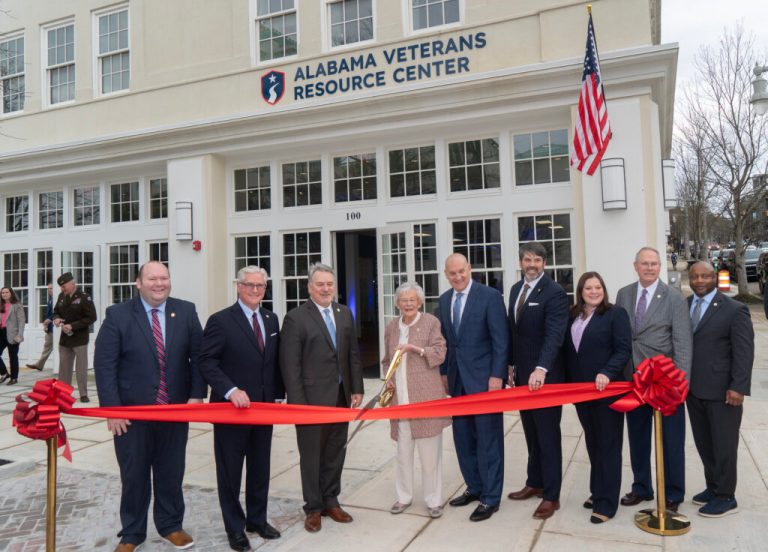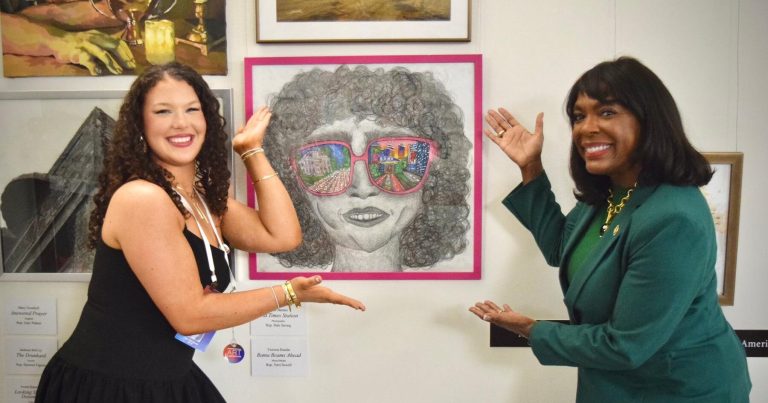Reviewed by: Sharron Swain
5 simple ways to make Alabama eco-friendly, including glass recycling + zero-waste events
Reading time: 9 minutes
Sponsored

What is a zero-waste event? Is it possible to recycle glass? Where can you purchase eco-friendly items? Are curbside recyclables really recycled?
In our previous two installments about recycling in Alabama, we examined the current state of recycling and profiled three successful recycling programs.
In this edition, we provide five ways you can support recycling and waste reduction, plus ways to connect with the programs and eco-trailblazers.
1. Hold zero-waste events

Visualize this: next year, Birmingham’s Virginia Samford Theatre (VST) is producing Stephen Sondheim’s award-winning musical Into the Woods.
According to Philip Mann, Executive Director of the VST, the entire set will be built with compostable and sustainable materials. That’s right—it will be a zero-waste production.
To Mann’s knowledge, nothing like that—constructing a set that doesn’t eventually end up in a landfill—has ever been done before in Alabama’s arts community.
Mann credits James Little, co-owner of Filter, a Birmingham based 5 Points South coffee shop, for helping guide him toward a zero-waste and sustainable future.
“We can only do really small things here, but we’re doing them step by step by step by step.”
Philip Mann, Executive Director, Virginia Samford Theatre
Other zero-waste efforts around the state

There is a movement afoot in Alabama.
Last spring, the Southern Environmental Center’s annual Darter Fest was one of the state’s first-ever zero-waste fundraising events.
In addition, Birmingham destinations like Birmingham Museum of Art, Red Mountain Theatre, Sidewalk Film Festival, UAB Solar House and Community and Virginia Samford Theatre are reducing waste by recycling more, eliminating single-use plastics and using items such as compostable bags, cups and plates.
And, it is not only The Magic City that is taking recycling and waste reduction seriously.
Since 2022, Huntsville’s Orion Amphitheater prevented the use of over 520,000 single-use cups. In partnership with the Tennessee Riverkeeper, they offered a reusable cup program and filtered water refill stations.
Orion is also the only concert venue in the state that recycles glass through Rocket City-based Phoenix Glass Recycling.
CONNECT: Here are several ways to join the zero-waste movement across Alabama:
- Volunteer: Bham FOOD+Culture Festival is holding a zero-waste food tasting event October 12-15. Contact Amavida Coffee and Trading Company at james.little@amavida.com to volunteer. Amavida is the zero-waste sponsor providing the compostable products and will be collecting the compostable and recyclable materials.
- Recruit: The Alabama Environmental Council is recruiting restaurants to join their EATS Restaurant Initiative, a statewide recycling/waste reduction/sustainability program. Birmingham members include Bottega, Filter, Red Cat, Birmingham Breadworks, Rojo, Sol Y Luna and a dozen others.
- Attend: See sustainable living in action at the free, public UAB Solar Home Tour on Saturday, October 7.
2. Bring glass recycling to your community

Currently, household glass recycling is nearly non-existent in Alabama.
Right now, these are your options for recycling glass in Alabama;
- Free glass recycling drop offs at Target locations.
- The Phoenix Glass Recycling program offers some curbside programs in Madison County for a monthly fee.
- A handful of other glass recycling sites scattered across the state.
The good news? Help is on the way.
A New Orleans-based business called Glass Half Full is moving into Alabama.
This innovative company offers a new option for commercial and residential glass recycling via drop offs or subscription pickups.
They use the glass for restoring the environment, including:
- Wetlands remediation
- Coastal reclamation
- Composting
On the Gulf Coast, Glass Half Full is already partnering with the University of South Alabama, Dauphin Island Sea Lab and the town of Dauphin Island to find ways to use glass for coastal restoration.
In Birmingham, they are working with Jones Valley Teaching Farm on ways to incorporate recycled glass in composting to enhance farm production.

“A lot of people don’t believe that their individual actions matter in terms of the grand scheme of our environment and improving things in their community. But the reality is that individual actions add up and influence other, bigger, actions. Glass Half Full is a great example of that.
We started as two college kids in a backyard, recycling one bottle at a time, and we’ve now diverted over 5 million pounds of glass from landfills. That would have never happened without individuals understanding that they can make a difference.”
Franziska Trautmann, Co-Founder and CEO, Glass Half Full
CONNECT: Glass Half Full is already signing up residential and commercial glass recyclers in the Birmingham metro area and plans to expand across the state from there. The subscription fee has not been set yet. Sign-up below to show your interest.
3. Recycle household paper + sensitive documents

If you have old bank statements, receipts or a pile of sensitive papers from a loved one who passed away and want to shred them, you’re in luck.
While numerous groups in Birmingham can handle such items, one of our favorites is the United Ability’s Gone for Good program.
According to their latest numbers, the group recycled over 1,000 tons of paper last year. Additionally, about 50% of Gone For Good employees have some type of disability.
Some of Gone for Good’s local commercial clients include:
- Protective
- Ascension St. Vincent’s
- Shipt
- Hibbett Sports Distribution Center
In addition, individuals in Birmingham can drop off junk mail, newspapers, magazines and sensitive documents at their location just off of Lakeshore Drive.
- Where: 101 Oslo Circle, Birmingham 35022
- When: Monday-Friday 8AM-noon
- Contact: (205) 943-5252
There are fees, which are based on the services required.
“At Gone For Good, our unwavering dedication extends beyond our mission of empowering individuals with disabilities through meaningful employment. We are devoted to delivering unparalleled customer service, adhering to the highest industry security standards, and making the most profound environmental impact by recycling every bit of paper and e-waste we receive.”
Abe Bernstein, Director of Gone For Good, a Program of United Ability
CONNECT: To recycle paper and sensitive documents, reach out to United Ability’s Gone for Good program.
4. Help ensure your curbside recyclables are actually being recycled


Many locals who put recyclables out on the curb each week question whether their items are truly being recycled or winding up in the landfills.
Fueling the distrust is the fact that the facilities that separate the recyclables— called materials recovery facilities (MRF)—are not required to report to the local governments on the amount of recyclables they have sold and shipped to end users.
The Recycling Partnership, a national nonprofit organization dedicated to seeing recycling succeed, has pulled together a guide complete with contract requirements that can ensure transparency for local residents and provide the public and local governments accurate recycling numbers.
“One of the key ways we can create a more resilient curbside recycling system in the U.S. is to make community and MRF contracts work better for both sides.”
Scott Mouw, Senior Director of Strategy and Research, The Recycling Partnership
CONNECT: Make sure your curbside recyclables actually get recycled—download The Recycling Partnership’s guide and toolkit, Guide to Community MRF Contracts.
5. Use eco-friendly products in your local business

Instead of single-use styrofoam cups or clamshell to-go containers, restaurants and coffee shops are starting to use more compostable plant-based packaging. Plant-based options take less energy to produce and are not made with “forever” chemicals such as PFAS (synthetic chemicals used in a variety of items including fast food boxes—high concentrations of which may lead to health risks).
Dan Bailey, with Amavida Coffee and Trading Company, a certified B-corporation located in the Florida panhandle, provides a number of eco-friendly products for restaurants, coffeehouses and retail operations across Florida and beyond. He encourages consumers to practice the 4 Rs.
“Reduce, reuse, recycle and then refuse. How do you integrate that into what you do as a consumer? You have to ask yourself—what can I do that reduces the amount of damage to the environment?”
A number of companies are selling certified sustainable packaging, but the one Bailey offers—World Centric—has really taken off with local small businesses.
“We see a shift. It’s kind of cool to watch and be a part of providing solutions,” added Bailey.
Cost of Eco-friendly products are coming down

The cost of eco-friendly alternatives are dropping due to increased demand and efficiencies of scale. They are also becoming more available and expected by patrons, according to Bailey. For example, a 9x9x3 take-out container made from styrofoam costs about 13 cents vs. an unbleached fiber one that costs about 21 cents.
Most consumers are willing to pay an additional 8 to 10 cents on an average lunch ticket of $8.00 – $12.00.
As consumers learn about the health and environmental hazards of non-compostable materials, they are starting to demand eco-friendly alternatives. It is a positive PR move by restaurants that could gain them more business.
CONNECT: Encourage local restaurants to introduce certified sustainable to-go items.
Start by checking out World Centric’s catalog and talk to Bailey at Amavida Coffee and Trading Company for guidance.
Future of recycling in Alabama
As reported in the first story in our series, we have a long way to go to reach the 1989 goal of recycling 25% of our household waste in Alabama.
The good news: Thanks to state recycling grants, innovative companies, and people who care about our environment—we are on track to do better and reach the state’s 30+ year-old goal.
Sponsored by:




